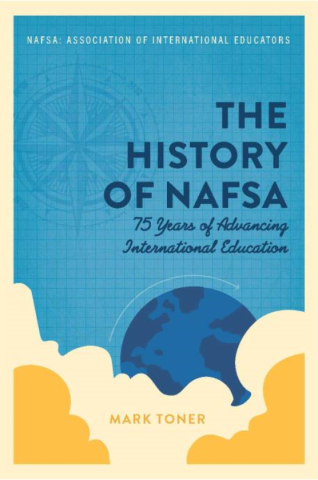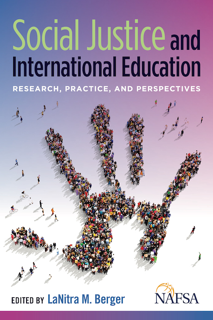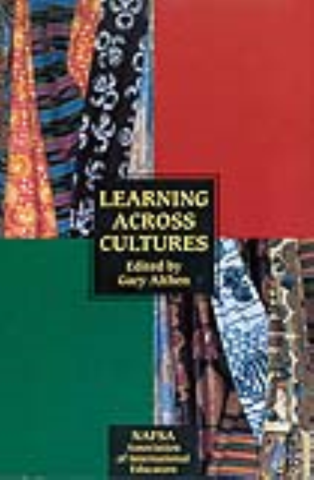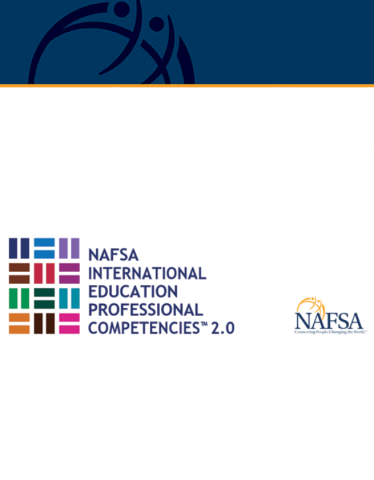The History of NAFSA: 75 Years of Advancing International Education
At a time when international education is more important than ever, The History of NAFSA provides a timely and insightful perspective on internationalization and campus impact. The book makes a compelling case for the importance of international education in fostering global citizenship, building bridges between cultures, and addressing the pressing policy challenges in immigration and education.
Whether you're an educator, higher education professional, or someone interested in the history and future of international education, The History of NAFSA is a must-read publication.
Drawing on extensive research and interviews with key figures in the organization, Mark Toner chronicles NAFSA's evolution from a small group of international education pioneers to a thriving professional association with more than 10,000 members. He explores the challenges and triumphs of NAFSA’s growth, from its role in establishing the Fulbright program to its advocacy for international students and scholars in the wake of September 11, 2001, and the COVID-19 pandemic.
Visit the 75th anniversary website for more information on NAFSA's history.
Table of Contents:
Chapter 1: 1948-1959: An Emerging Field Finds Its Voice
- The Beginning
- What's Past Is Prologue
- 'A Horizontal Association'
- The Early Years
- Finding Its Voice
Chapter 2: 1960-1969: A Call to Service and a Continued Commitment
- A Call to Service
- The Growth of the Profession
- A New Name, but a Continued Commitment
- The Great Society and International Education
Chapter 3: 1970-1979: 'Standing at the Edge of Change'
- Challenge and Crisis
- Supporting Professionalism and Internationalization
- Coming Full Circle
Chapter 4: 1980-1989: Setting the Stage for the 'End of History'
- Tensions and Conflicting Goals
- Standards and Ethics
- A Growing - and Evolving - Association
- A Milestone, and the 'End of History'
Chapter 5: 1990-1999: 'An Expectant but Confused World'
- Ambitious Goals amid Headwinds
- Responding to a Changing World
- A Changing of the Guard
- Challenges and Crises
- New Name, New Priorities
- A Golden Anniversary
Chapter 6: 2000-2016: Optimism and Challenge in a New Century
- A New Century, a New Policy Priority
- September 11, 2001: A Changed Climate
- Comprehensive Internationalization
- Professionalizing the Field - and the Association
- Precursors to Change
Chapter 7: 2016-2022: The World Turned Upside Down
- Entering the Pandemic Era
- A 'Safe Harbor'
Chapter 8: Past as Prologue: NAFSA's Enduring Values
- Bringing the World Together: Annual and Regional Conferences
- Supporting International Students: Social Justice and Advocacy
- Advocacy with Purpose
- Promoting Diversity, Equity, and Inclusion
- Thought Leadership and Resources: Professionalizing the Field
- Publications and Scholarship
- Professional Learning
- NAFSA's Members: 'We Are Stronger When We Work Together'
- Regions: The 'First Step' into International Education
- Sections and Knowledge Communities
Chapter 9: Epilogue

The History of NAFSA: 75 Years of Advancing International Education
At a time when international education is more important than ever, The History of NAFSA provides a timely and insightful perspective on internationalization and campus impact. The book makes a compelling case for the importance of international education in fostering global citizenship, building bridges between cultures, and addressing the pressing policy challenges in immigration and education.
Whether you're an educator, higher education professional, or someone interested in the history and future of international education, The History of NAFSA is a must-read publication.
Drawing on extensive research and interviews with key figures in the organization, Mark Toner chronicles NAFSA's evolution from a small group of international education pioneers to a thriving professional association with more than 10,000 members. He explores the challenges and triumphs of NAFSA’s growth, from its role in establishing the Fulbright program to its advocacy for international students and scholars in the wake of September 11, 2001, and the COVID-19 pandemic.
Visit the 75th anniversary website for more information on NAFSA's history.
Table of Contents:
Chapter 1: 1948-1959: An Emerging Field Finds Its Voice
- The Beginning
- What's Past Is Prologue
- 'A Horizontal Association'
- The Early Years
- Finding Its Voice
Chapter 2: 1960-1969: A Call to Service and a Continued Commitment
- A Call to Service
- The Growth of the Profession
- A New Name, but a Continued Commitment
- The Great Society and International Education
Chapter 3: 1970-1979: 'Standing at the Edge of Change'
- Challenge and Crisis
- Supporting Professionalism and Internationalization
- Coming Full Circle
Chapter 4: 1980-1989: Setting the Stage for the 'End of History'
- Tensions and Conflicting Goals
- Standards and Ethics
- A Growing - and Evolving - Association
- A Milestone, and the 'End of History'
Chapter 5: 1990-1999: 'An Expectant but Confused World'
- Ambitious Goals amid Headwinds
- Responding to a Changing World
- A Changing of the Guard
- Challenges and Crises
- New Name, New Priorities
- A Golden Anniversary
Chapter 6: 2000-2016: Optimism and Challenge in a New Century
- A New Century, a New Policy Priority
- September 11, 2001: A Changed Climate
- Comprehensive Internationalization
- Professionalizing the Field - and the Association
- Precursors to Change
Chapter 7: 2016-2022: The World Turned Upside Down
- Entering the Pandemic Era
- A 'Safe Harbor'
Chapter 8: Past as Prologue: NAFSA's Enduring Values
- Bringing the World Together: Annual and Regional Conferences
- Supporting International Students: Social Justice and Advocacy
- Advocacy with Purpose
- Promoting Diversity, Equity, and Inclusion
- Thought Leadership and Resources: Professionalizing the Field
- Publications and Scholarship
- Professional Learning
- NAFSA's Members: 'We Are Stronger When We Work Together'
- Regions: The 'First Step' into International Education
- Sections and Knowledge Communities
Chapter 9: Epilogue





